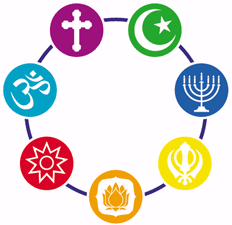
Southampton Council of Faiths - Baha'i
What is a Bahá’í?
Bahá'u'lláh is recognized by his followers, Bahá’ís, as the Messenger of God for this age. The Bahá’í Faith is founded on His teachings. He was born in 1817 to a prominent family in Iran, He followed a particular devotion for the relief of the poor. He identified Himself as Bahá'u'lláh, which means Glory of God, a title by which He was addressed by His Forerunner, the Báb. Because of His teachings, He was banished in exile lasting forty years, taking Him to the Holy Land. He died in 1892.
What does a Bahá’í believe?
Humanity is now coming of age, making possible the unification of the human family and the building of a peaceful, global society. Among the principles vital to the achievement of this goal are:
-
the abandoning of all prejudices
-
assurance to women of full equality of opportunity with men
-
recognition of the unity and relativity of religious truth
-
the elimination of extremes of poverty and wealth
-
the realization of universal education
-
the responsibility of each person to independently search for truth
-
the establishment of a global commonwealth of nations
-
recognition that true religion is in harmony with reason and the pursuit of scientific knowledge
How does a Bahá’í worship?
The Bahá’í Faith has general social principles that serve to guide social policy. The advancement of human civilization must happen gradually and organically. It does not happen through political leadership or legislation but through individuals who are motivated to transform their own lives and, in so doing, gradually transform society.
How does a Bahá’í live?
As with many other aspects of the Bahá’í Faith, marriage is seen as having both a physical and a spiritual aspect.
The Bahá’í teachings give great importance to the family as both the bedrock of the individuals spiritual development and the foundation for societys stability and progress. Education is vitally important.
The Bahá’í teachings strongly condemn the holding of prejudices of any kind.
Bahá'u'lláh has, in several places in his writings, asserted that men and women have an equal rank and station before God
The Bahá’í world-view accords the sciences and technology a high place. The human mind and its reasoning ability are one of the distinguishing marks of humanity, and science, which is the fruit of this, is regarded as a divine gift. In particular, the conflict that has occurred between science and religion over such concepts as evolution is considered to have been wrong. Science and religion should instead be seen as complementary aspects of human progress and development.
All around us there are many individuals and groups claiming rights and freedoms. The desire and drive for freedom have been one of the main themes of the twentieth century. Religious freedom, political freedom, the right to free speech, the right to work freely, the right to spend your money freely, the freedom to travel; all of these are freedoms that have gradually been won, in the West at least, during this century. The question must however be raised as to where this quest for freedom stops.
Bahá'u'lláh recommended that a monarch be kept as head of state since the majesty of kingship is one of the signs of God. We do not wish that the countries of the world should remain deprived thereof. He therefore advised a combination of democracy and kingship (i.e. a constitutional monarchy)
Rather than aiming to put a programme of social laws in place, the Bahá’í Faith has general principles that serve to guide social policy. In the Bahá’í view the advancement of human civilization must happen gradually and organically. It does not occur through political leadership or legislation. It can only occur through individuals who are motivated to transform their own lives and, in so doing, gradually transform society.
Who leads Bahá’ís?
The Bahá’í Faith's administration is a unique system created by Bahá'u'lláh and based on principles of consultation and cooperation. After the passing of Bahá'u'lláh, the Faith was led fi rst by His eldest son, ‘Abdu’l-Bahá, and then by His great-grandson, Shoghi Effendi. It has been governed internationally since 1963 by the Universal House of Justice. Spiritual Assemblies direct Bahá’í activities in local and national communities. Appointed advisors Continental Boards of Counsellors and Auxiliary Board members assist and encourage Assemblies and communities in their development.
Baha'i Festivals:
Bahá’ís fast in the final month of the Bahá’í calendar, the fast ends with the new year festival of Naw-Ruz on the 20th of March.Ridvan is also an important festival commemorating the day Bahá'u'lláh declared his mission. The Bahá’ís also elect their Local Spiritual Assembly during this festival.
Download a pdf of this document here (1900k)



Useful Links
BBC web site - http://www.bbc.co.uk/religion/religions/bahai
Southampton Bahá’í website - http://www.southamptonbahais.org
Local Contacts
TBA
